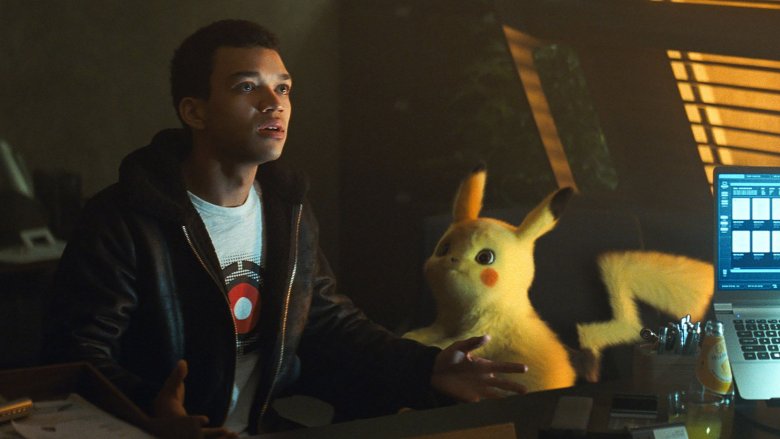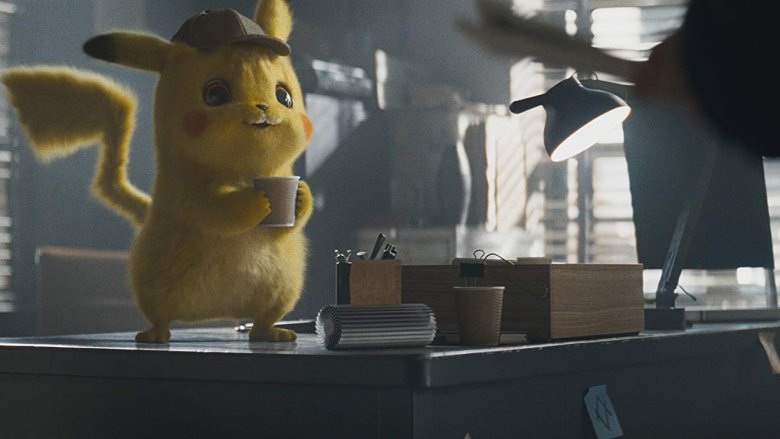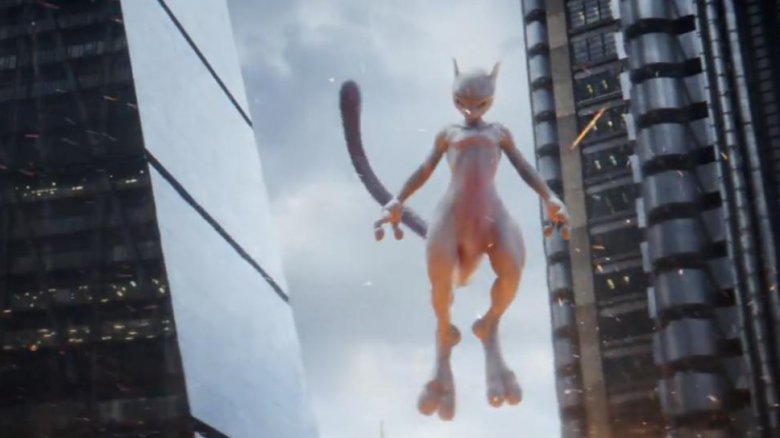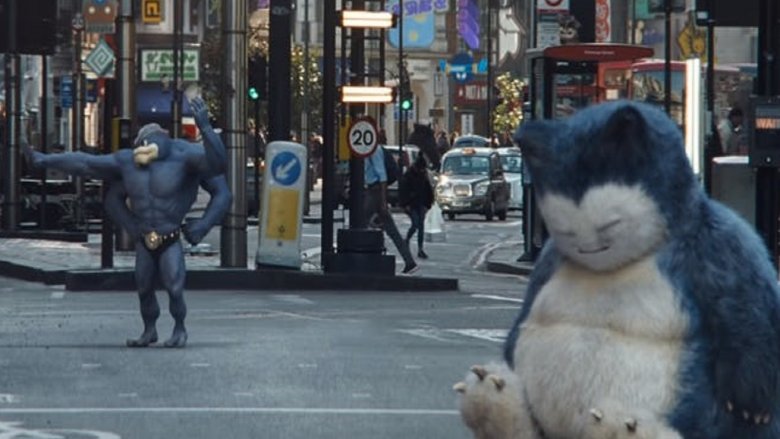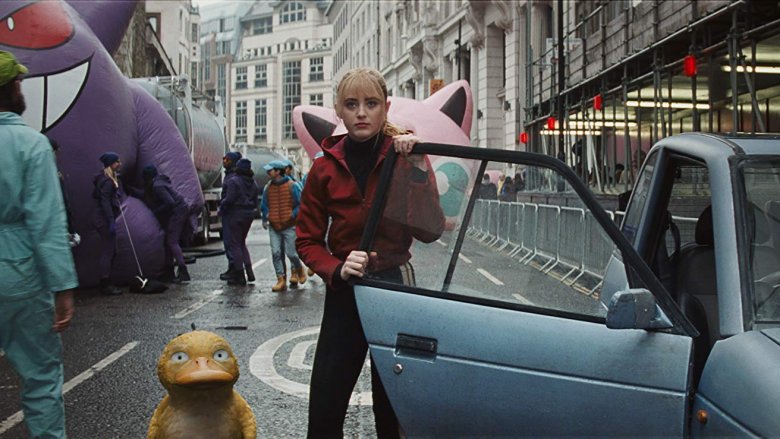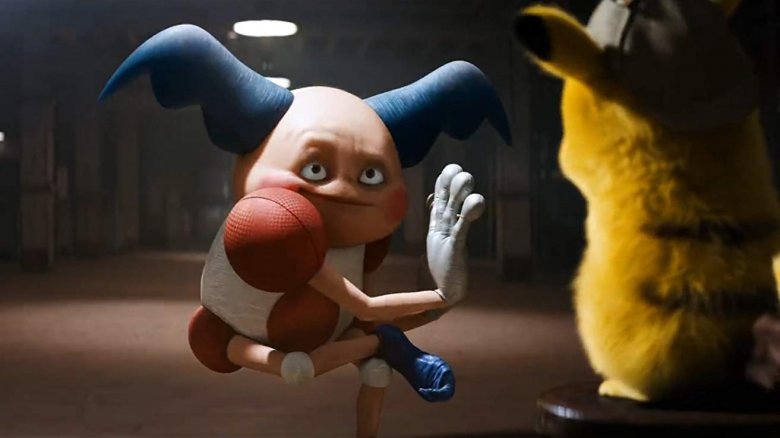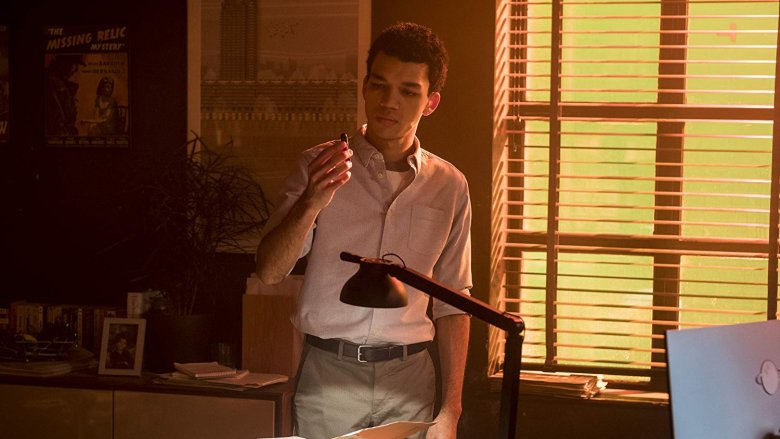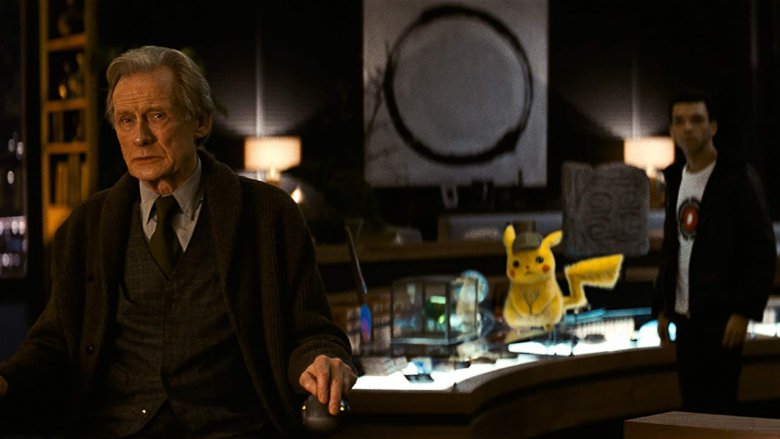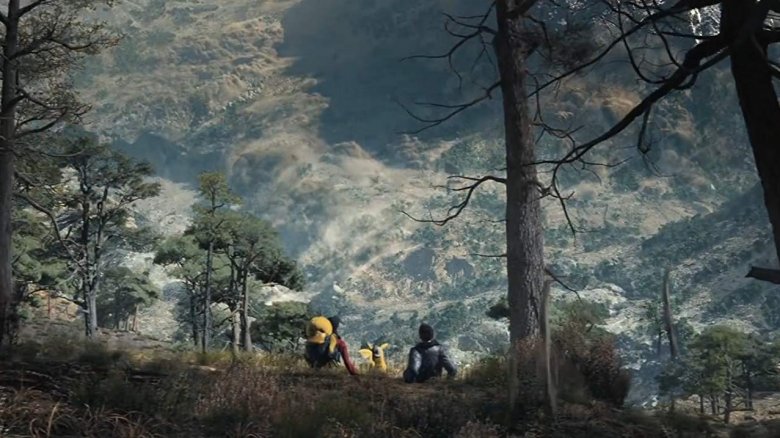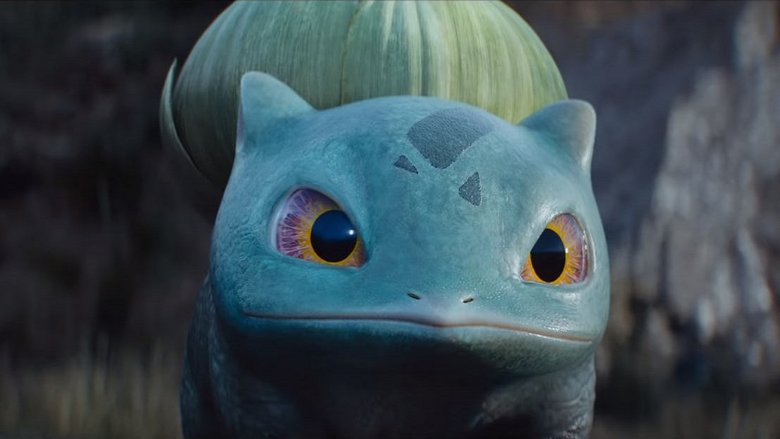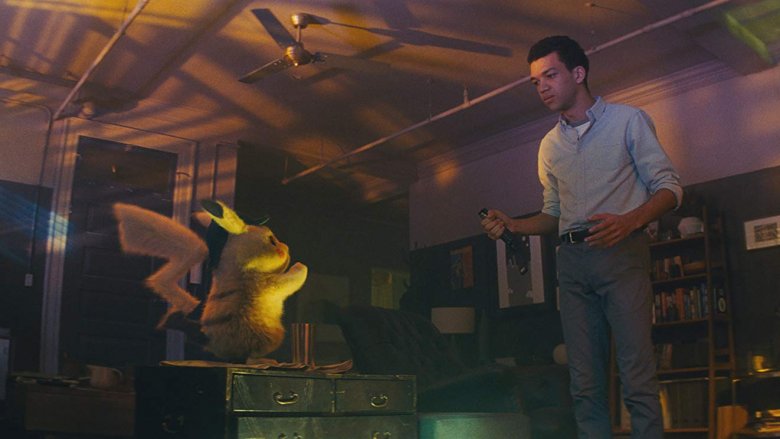The 5 Best And 5 Worst Things About Pokemon: Detective Pikachu
After years as one of the most successful franchises in the world, Pokémon has finally entered the realm of live-action filmmaking with Detective Pikachu, a family adventure packed to the rafters with CGI Pokémon and starring Ryan Reynolds as the title character, a talking Pikachu with a mystery to solve. So now that it's out in the world, what do we think of Detective Pikachu?
Like so much of the Pokémon world that's come before, there's a lot to like. It's funny, it's got heart, and it's full of Easter eggs of all sizes for longtime fans and newcomers to the franchise to enjoy. That doesn't mean it's without its weaknesses. Just as Pokémon are weak against certain other types of Pokémon, Detective Pikachu is weak when it comes to executing certain aspects of its twist-filled yet often predictable narrative, even when the cast is bringing the charm. Now that we've had a chance to see the movie, here are the five best and five worst things about Detective Pikachu.
Spoilers ahead for the whole film!
Best: Ryan Reynolds
Any number of actors and actresses could have been called upon to voice Pikachu, particularly when you consider the tongue-in-cheek tone this film was always going for. The casting could have come from far out in left field, or they could have simply gone with the cutest-sounding option. The possibilities were endless, but for Detective Pikachu the filmmakers went with Ryan Reynolds, a guy whose voice we're used to hearing from behind a Deadpool mask.
Somehow, it works. Reynolds' meta-textual, hyperactive delivery strikes the perfect balance of weird and relatable in the film, in part because he almost still sounds shocked that he got the part. From yelling at Mr. Mime to carrying off complex emotional moments, he lands every beat with a combination of wit, vulnerability, and pure fun. A lot of things about this film don't work, but Reynolds' voice performance most definitely does, and it's helped along by the fact that even an hour into the runtime, you're still not entirely used to hearing Pikachu talk.
Worst: Mewtwo, again
Though Detective Pikachu is the first live-action Pokémon film, it's definitely not the first theatrical release in the franchise. That honor goes to Pokémon: The First Movie, which was released in 1998 and which centered on, among other things, the rise of the genetically engineered Pokémon known as Mewtwo. Mewtwo was a powerful, enigmatic figure to Pokémon fans in those days, and while the world of Pokémon is considerably more vast now, many longtime Pokemaniacs still remember when he first arrived on the big screen.
Perhaps out of nostalgia for the impact of the first film, or perhaps just because of sheer name recognition, Detective Pikachu also opted to devote a big chunk of its plot to Mewtwo, beginning with the psychic Pokémon's escape from a containment facility and continuing right up to another "Mewtwo's not the villain after all" reveal. If you're a young Pokémon fan, this isn't necessarily a problem. If you're old enough to remember when Mewtwo was still a relatively new creation, it feels a little stale.
Best: The Pokémon
Detective Pikachu is the first live-action Pokémon movie, and that means no matter how invested they are in the story, Pokemaniac moviegoers are really turning up to the theater for the Pokémon themselves. Yes the film is rooted in an emotional father-son story that is itself wrapped around a mystery with the fate of the world at stake, but come on. We know what people are really showing up for.
In that respect, the film absolutely delivers, so much so that children in the theater will have trouble resisting calling out each individual Pokémon as they see them for the first time. The film delights in tucking the creatures into every nook and cranny of the story, from the Pidgeys flying around in the opening minutes to the Lickitung on the train and the herd of Bulbasaur who help out Tim and Pikachu near the end of the film. The film is a two-hour Pokémon hunt that just happens to have a story running through it, and the filmmakers never cease to delight in how many ways they can sneak the various types into the frame. If you've ever played a Pokémon game, watched the anime, or just shown an interest in the sheer variety of these creations, it's a joy to watch.
Worst: Underusing Lucy
Though most of the film's trailers are devoted to him and his friendship with Pikachu, Tim Goodman (Justice Smith) is not the only young adventure on the case in Detective Pikachu. He teams up with Lucy Stevens (Kathryn Newton), a reporter chasing her big break who's certain Tim's father is the secret to breaking her story wide open. Lucy's a fun character when she gets the chance to be, and Newton's a talented young actress, but while the film spends a lot of time making us care about Tim, it spends considerably less time helping us understand Lucy. She's a reporter and she wants to report. That's basically her entire arc, and as intrepid as she is, we aren't given much more than that. This isn't necessarily a problem, but it feels like the film could have given her a little more to do than simply run around chasing leads (which she often falls into thanks to Tim and Pikachu) and then feed plot information to Tim. Here's hoping we get to see more detailed adventure from Lucy Stevens, Ace Pokémon Reporter, in the future.
Best: Mr. Mime
Pokémon is one of the most popular franchises in the world. It's also a deeply weird concept that's inspired no small amount of internet theorizing and analysis over the years. Sure, Detective Pikachu could have played things straight for its entire runtime, but with someone like Ryan Reynolds on board we had to suspect the film would lean into the weirdness more than a little bit. This is best encapsulated in Mr. Mime.
Yes, the whole movie delights in being just a little bit weird, but for a few brief minutes near the beginning it delights in being super weird, as Tim and Pikachu interrogate a Mr. Mime who seems to have an association with the amnesiac Pikachu but will only communicate in the form of, well, miming. This all culminates in Tim somehow also getting mime powers (or at least convincing Mr. Mime that he has them) and pretending he's about to light the poor Pokémon on fire, Reservoir Dogs-style, and in Pikachu screaming "Just talk, you stupid mime!" in a way that will make even the most jaded viewers crack up. It's a deeply strange sequence that really pays off.
Worst: A formula
When it's at its best, Detective Pikachu just really embraces how strange and unpredictable a world populated with Pokémon is, and delivers some truly bonkers developments. This is particularly true in the third act, when Pokémon are just straight-up possessed during a citywide psychic attack helped along by a dangerous chemical released into the atmosphere. It's fun.
The rest of the time, though, the film has to get by on somewhat by-the-numbers storytelling. There's a kid with daddy issues and a tragic past, an amnesiac character with a secret, a local reporter to help fill in plot details, an evil tycoon hellbent on keeping his secret plan secret until the very last minute, and a villain-who's-not-a-villain taking a turn at the last possible moment to save everyone. There's a lot of cookie cutter adventure storytelling happening here, and it all pays off more or less exactly how you'd expect it to. This stands in stark contrast to the one truly inventive bright spot that is the third act, which only makes the formulaic moments seem more glaringly obvious.
Best: That third act
In another movie, the Mr. Mime sequence might have been as weird as things ever got, but this is not another movie. This is Detective Pikachu, and in this movie we get even weirder. For much of the film's runtime, the central mystery revolves around a mysterious gaseous substance known as "R," which seems to be used only to make Pokémon turn wild and therefore extra aggressive. In the underground battle clubs in Ryme City, they use it to make their Pokémon particularly savage fighters, and that seems like a good enough reason for a conspiracy. Then the film makes its turn into the third act, and we learn that "R" has a much stranger purpose.
You see, "R" turns the Pokémon wild, but not just so they're more aggressive in battle. It also makes them more suggestible, and Howard Clifford (Bill Nighy) plans to use this — and the power of Mewtwo — to transfer the souls of human beings into Pokémon... you know, so humans and Pokémon can finally merge into one species. That leads to a final battle sequence in which almost everyone in Ryme City briefly goes inside their own Pokémon at the behest of an evil billionaire. All of that, plus that truly creepy stuff with Clifford's Ditto servant, makes this a third act that's one of the most delightfully bonkers things you'll see in movies this year.
Worst: Missed opportunities
Detective Pikachu's relatively formulaic plotting isn't necessarily a problem. Lots of family adventure films follow plots that a seasoned moviegoer can easily track. What makes the film's more obvious choices stand out more, though, is how much more interesting stuff those choices are surrounded by. At one point Tim and Lucy try to escape the villain's secret research facility, and the forest starts moving around them. That's when they realize they're not in a forest, but they're standing on living Pokémon who've been grown to gigantic size by the villain's experiments.
This is a neat idea, but as soon as the film makes it obvious what's happening, these giant Pokémon settle back down and the forest becomes a forest again. They're never mentioned again, never used to further anything in the story, and never weaponized. The film is full of little missed opportunities like this, opportunities to take the plot off in a less predictable direction or even craft an amusing sidequest for a little while, and unfortunately you leave the film wishing more of those little narrative threads would have been picked up again.
Best: Room to grow
Detective Pikachu is a two-hour film that has to establish its main character, set up its central mystery for a payoff, introduce an entire city with a unique concept, introduce us to dozens of creatures each with different abilities, and more. That's a lot to pack into one film, and while it creates certain problems, it also creates something else that might end up being more important to the film: potential.
The adventure that Tim and Pikachu go on is more or less neatly wrapped up by the end of the film, but the world in which it takes place most definitely isn't. A live-action Pokémon universe exists now, and Detective Pikachu could serve as proof-of-concept and marketability for an entire megafranchise of adventures, from Lucy's future as a reporter to Tim's new life as a Pokémon trainer (assuming he goes that route) to a whole host of other stories following characters we haven't even met yet. Detective Pikachu works as a standalone film, but it also includes tremendous room for growth.
Worst: That last twist
If you've been paying attention to the marketing for Detective Pikachu, and its very clear emphasis on Tim abandoning his childhood dreams and keeping relatively distant from his father, you might be able to guess the film's big twist without even seeing it. The film itself makes the twist even more obvious by always making sure that flashbacks show Tim's father only from the back, and that's because...
Ryan Reynolds is his dad.
Yup, Reynolds not only voices the Pikachu, he also plays Harry Goodman, the missing detective and Pikachu's owner, whose soul was transferred into his own Pokémon by Mewtwo to save his life. This isn't necessarily a bad plot development, as it allows Tim to get know a side of his father (who, as Pikachu, is missing his memories) that he never saw before. By the end of the film they're closer because of the adventure they went on together, but it's so telegraphed and predictable that, by the time it's revealed, this barely counts as a plot twist anymore. It also, by the way, removes the possibility that Pikachu can actually talk on its own, which just makes the film seem more boring in hindsight.
